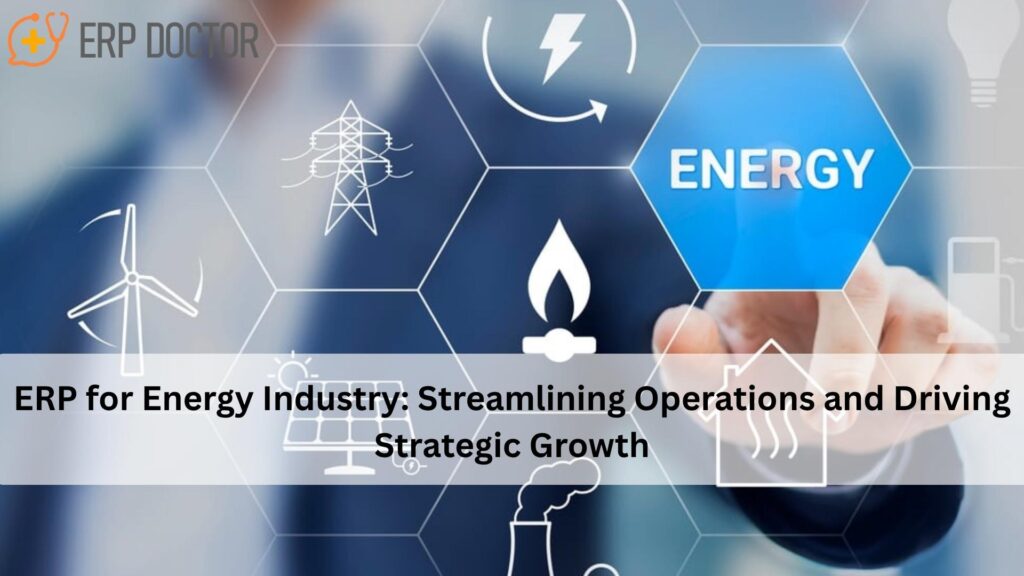
ERP for Energy Industry: Streamlining Operations and Driving Strategic Growth

Energy Industry Performance Through ERP for Operations and Compliance
The energy sector is undergoing rapid transformation. Increasing energy demand, environmental regulations, and the global transition toward renewable energy are creating operational complexities for companies. Managing production, distribution, billing, compliance, and workforce simultaneously can strain traditional systems, slow decision-making and impacting profitability. Implementing ERP for Energy Industry provides an integrated solution that unifies core business processes, improves operational efficiency, and enables better decision-making. Energy ERP software consolidates data from multiple departments into one platform, offering real-time insights, resource optimization, and actionable analytics. Solutions such as SAP Business One for Energy help organizations monitor performance, reduce operational costs, and support long-term strategic planning.
How ERP for Energy Sector Improves Operations and Performance
Energy industry face numerous challenges, including managing complex production and distribution networks, tracking energy consumption, ensuring workforce efficiency, and maintaining compliance with strict environmental regulations. Traditional software systems often operate in silos, creating inefficiencies and delaying critical decisions.
By implementing Energy Management ERP, organizations can integrate finance, operations, customer management, and supply chain processes into a single platform. The system automates repetitive tasks, reduces manual errors, and provides real-time data, allowing executives to make informed decisions quickly. Decision-makers gain better control over operational costs, workflow management, and risk mitigation, which are crucial for sustaining profitability and competitiveness.
Benefits of Implementing ERP for Energy Industry and How It Impacts Business Growth
1. Streamlined and Integrated Operations Across All Departments
One of the most significant advantages of Energy ERP software is its ability to centralize workflows across all business functions. Production teams, finance departments, customer service teams, and field operations can access a unified system, enabling seamless communication and collaboration. This eliminates redundancies, reduces operational delays, and ensures that data remains consistent and accurate throughout the organization.
2. Significant Reduction in Operational Costs Through Automation
Energy companies often operate with tight margins, making cost optimization essential. ERP software automates key processes, including billing, resource allocation, and reporting, which reduces human error and eliminates unnecessary expenditures. By optimizing operations, companies can achieve higher efficiency while maintaining profitability in an increasingly competitive market.
3. Real-Time Analytics and Data-Driven Decision Making for Executives
ERP systems provide powerful dashboards and analytical tools that allow management to monitor production efficiency, track energy consumption trends, and assess financial performance in real time. This level of visibility enables executives to make strategic decisions based on accurate, timely data, rather than relying on outdated reports or fragmented systems.
4. Enhanced Regulatory Compliance and Risk Management
The energy sector is highly regulated, with strict environmental, safety, and industry-specific standards. ERP software ensures accurate record-keeping, automates compliance reporting, and provides audit-ready documentation. This reduces the risk of penalties or legal issues while supporting sustainable business practices that align with regulatory requirements.
5. Scalable Solutions to Support Growth and Diversification
Energy companies are increasingly diversifying into renewable energy sources and expanding into new markets. A well-implemented Energy sector ERP system allows organizations to scale operations efficiently, integrate new production sites, and manage growing customer bases without disruption to existing workflows.
6. Improved Customer Satisfaction and Relationship Management
By centralizing customer data, service requests, and billing information, ERP systems help energy companies deliver faster, more accurate services. Timely communication, efficient issue resolution, and precise invoicing enhance customer satisfaction and build long-term loyalty, which is critical for maintaining a strong market position.
Turning Energy Industry Challenges into Growth with ERP Solutions
By implementing ERP for Energy Industry, companies can transform operational challenges into strategic opportunities. Whether managing renewable energy projects, overseeing oil and gas production, or optimizing utility distribution, ERP solutions streamline workflows, automate routine tasks, and provide real-time insights for better decision-making. Energy companies can reduce operational costs, ensure regulatory compliance, and improve asset management while enhancing customer satisfaction through faster, more accurate services. Tailored Energy ERP software empowers executives and managers to focus on growth initiatives and long-term strategy rather than daily operational hurdles, creating a foundation for sustainable success across all sectors of the energy industry.
FAQs: ERP for Energy Industry
Q1: How does ERP reduce operational inefficiencies in energy companies
ERP integrates all departments into one platform, eliminates redundant processes, automates repetitive tasks, and provides real-time insights, significantly improving overall operational efficiency.
Q2: Can ERP support both traditional and renewable energy operations?
Yes. Modern Energy ERP software can manage conventional energy sources as well as renewable operations, including solar, wind, and hydroelectric energy.
Q3: How does ERP ensure compliance with energy sector regulations?
ERP systems maintain accurate records, automate reporting, and support adherence to environmental, safety, and industry regulations, reducing compliance risks and ensuring accountability.
Q4: Is ERP scalable to accommodate business expansion and diversification?
Absolutely. ERP systems are highly scalable, allowing companies to add new production sites, integrate additional customers, and expand services without disrupting ongoing operations.
Q5: How quickly can energy companies see results after ERP implementation?
Many companies notice improvements in operational efficiency, resource management, and customer satisfaction within a few months, with full benefits realized as the system is fully integrated.
Q6: What key features should energy companies look for in ERP software?
Effective ERP for energy companies should include modules for production planning, supply chain management, financial management, asset tracking, regulatory compliance, and customer relationship management to ensure end-to-end operational control.
Q7: How does ERP help in reducing operational costs in the energy sector?
ERP automates routine tasks, optimizes resource allocation, reduces manual errors, and improves workflow efficiency, which collectively lowers operational costs and improves profitability.
Q8: Can ERP improve customer service for energy companies?
Yes. By centralizing customer data, managing service requests, and streamlining billing, ERP helps energy companies respond faster, resolve issues efficiently, and enhance overall customer satisfaction.
Q9: How does ERP support decision-making for energy sector executives?
ERP provides real-time analytics, dashboards, and reporting tools that allow executives to monitor performance, forecast demand, and make data-driven strategic decisions across operations, finance, and customer management.
Q10: Is ERP implementation complicated for energy companies with multiple locations?
While implementation requires careful planning, modern ERP systems are designed to handle multiple locations and business units, providing centralized control while allowing for local customization and smooth integration.



